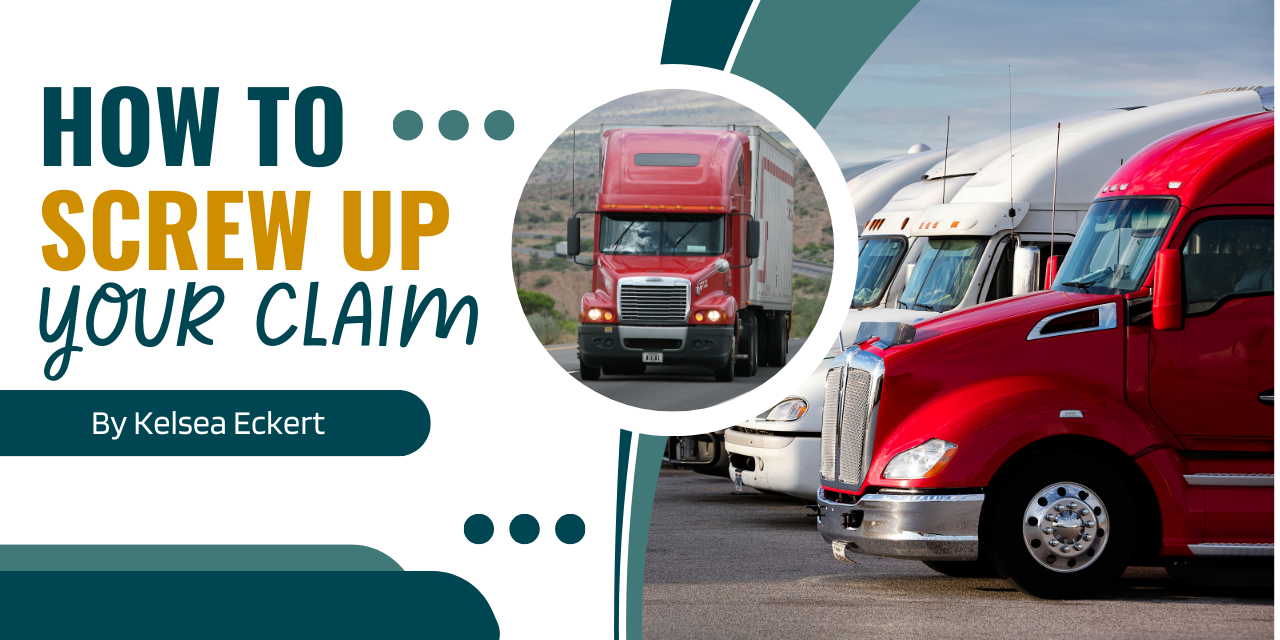Rescue Your Revenue

How to Screw Up Your Claim 101: A Beginner’s Guide
Has your equipment been in a traffic accident recently? Is the claims process a bit confusing? Has the insurance company refused to pay what you requested?
Navigating the world of insurance claims can be daunting, even for experienced claimants. If you’re unfamiliar with the process, there are plenty of opportunities to make missteps that can harm your chances of receiving a full settlement.
Here’s a quick list of some of the more common pitfalls truckers often encounter:
1. Not Asking for Everything You’re Due:
Remember to request all your out-of-pocket expenses, repair invoices, towing and hotel bills, equipment’s diminished value, and loss of income. Be thorough when gathering invoices and detailed in documenting all financial losses to ensure you’re fully reimbursed. Don’t leave money on the table!
2. Signing a Property Damage Release Prematurely:
One of the most common mistakes people make is signing a release before all damage is known. Signing too early can limit the ability to collect additional repair costs that arise during the repair process.
3. Assuming a Property Damage Release Only Covers the Repairs:
While a property damage release may specifically exclude personal injuries, it typically includes lost income due to downtime, diminished value, out-of-pocket expenses, and many other costs associated with the equipment repair. Read the release very, very carefully before signing, and have an attorney review it if you have questions.
4. Sharing Unnecessary and Damaging Information:
Only provide the minimal amount of information to an adverse adjuster. Saying you took a vacation during your equipment’s repair/downtime could raise questions about the urgency of your handling of the repairs and whether you genuinely experienced losses.
5. Providing Tax Returns Prematurely:
Your tax returns contain sensitive financial information which may not be relevant to your insurance claim. Sharing this information unnecessarily may weaken your claim and give the insurance company reason to reduce or deny your claim. Even if tax returns are requested, determine if the request is essential to resolving the claim.
6. Behaving Unprofessionally:
Dealing with insurance adjusters can be frustrating, especially when your equipment is down and the adjuster isn’t moving quickly. Losing your temper and behaving unprofessionally, however, may further delay the process, damage your credibility and harm your claim. Try to stay calm, composed and professional, even in challenging situations.
7. Making Unreasonable Demands:
Making unsubstantiated demands can backfire. An unreasonable demand will likely lead to a breakdown in negotiations or a substantial delay in resolution. Keeping a reasonable, realistic mindset will often help settle the claim more quickly.
8. Not Trying to Mitigate Losses:
Not every trucker can rent temporary equipment while theirs is down. However, adverse insurance companies want to see effort in attempting to mitigate losses. If there is no effort, the insurance company may deny your downtime claim or reduce it accordingly. It is helpful to have written proof from third parties showing the difficulty or impossibility of mitigating the losses.
9. Failing to Timely Handle Requests of the Insurance Company:
You may be asked to get an estimate or take the equipment to a certain shop. You may be asked to provide information about your equipment. Reasonable requests should be handled in a reasonable timeframe. Delays on your part will harm your claim.
10. Refusing to File a Claim with One’s Own Insurance Company When Necessary to Save the Business:
While no owner operator wants a claim on their insurance claims record, sometimes it’s necessary to save a business. In some cases, at-fault parties and their insurance companies deny claims. Other times, they just take too long. If the choice is between closing the doors of your trucking business or filing a claim with your own insurance company, consider the implications of each choice.
Navigating an insurance claim requires careful attention to detail and strategic negotiation. By avoiding common mistakes and pitfalls, you will increase your chances of recovering your entire loss. Stay proactive and informed by speaking with an experienced transportation attorney. With the proper research and guidance, you are better suited to protect your business, yourself and your family.
The information in this article is general in nature and does not constitute legal advice. If you are looking for assistance with your downtime claim, contact Eckert & Associates, P.A. at 904-278-7688.
